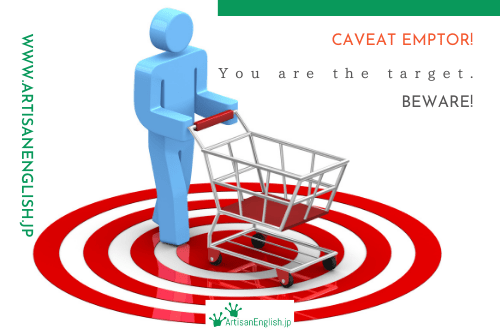
YouTube / iTunes / Spotify / Radio Public / Pocket Casts / Google Podcasts / Breaker / Overcast
Listen to ArtisanEnglish.jp posts & lesson intros here.
WotD: Caveat emptor
Raise your hand if you enjoy shopping.
Don’t worry if you’re on the train and feel silly.
Like or follow ArtisanEnglish.jp on social media.
No one’s looking at you.
If you do like shopping, then you should be aware of the Latin phrase caveat emptor.
It has become a proverb in English.
The word caveat means “take care.”
Emptor means “the person who purchases” or “the purchaser.”
Put them together, and caveat emptor means ‘buyer beware.’
The proverb caveat emptor was initially used to warn against fraud in sales transactions by lawyers or other experts like Cicero and Quintilian.
The phrase’s origin likely comes from Ancient Roman Law, which stipulated that no one could be forced to buy anything they didn’t want.
The first modern recorded use of this phrase was in 1606.
This proverb is used to say that if you buy something, you must take responsibility for the quality of the goods you wish to purchase and do your due diligence.
In other words, before you buy something, do your homework.
This is especially true when purchasing a home, car, investment property or anything else that you can’t pay for with pocket money.
Yes, sure, the seller should be honest and provide the best quality with full disclosure of any known problems an item may have.
Unfortunately, money and honesty are not often used in the same sentence.
Did you know if you want to buy a home, in most cases, a realtor does not have to tell you if there has been a death or murder on the property?
That’s right. If you don’t ask the question, they don’t have to volunteer information.
If you do not want to buy an incident property, remember – caveat emptor – let the buyer beware.
Flesch-Kincaid Readability Test
This post is understandable by someone with at least a 7th-grade education (age 12).
On the Flesch-Kincaid reading-ease test, this post scores 70.
The easier a passage is to read, the higher the score on a scale of 0 – 100.